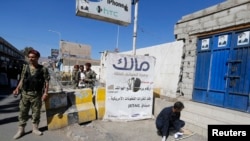Yemen's Houthi rebel leader Abdel-Malak al-Houthi defended the takeover of power in a speech Saturday, saying it filled a political "vacuum" and was in the interest of the Yemeni people.
Yemen's Gulf neighbors denounced the Shiite rebel takeover of the country as a "coup" Saturday, as thousands of Yemenis took to the streets to protest the power grab.
The six-nation Gulf Cooperation Council, led by Sunni-ruled Saudi Arabia and the United Arab Emirates, labeled the Houthi rebels' actions an unacceptable "escalation." They said it threatens the country's security and stability.
In addition to the protests in several Yemeni cities, including the capital, Sanaa, a bomb exploded Saturday near the presidential palace, wounding at least three people,
The Houthi militia dissolved parliament Friday and announced its plan to govern the majority-Sunni nation, which lies on the Arabian Peninsula just south of Saudi Arabia.
In a televised statement, the Houthis said they would replace parliament with a 551-member national assembly, which in turn will elect a five-member presidential council to manage the country for up to two years.
The Houthis swept into Sanaa in September and seized the presidential palace last month, forcing U.S.-backed President Abd Rabbuh Manṣour Hadi and his cabinet to resign.
U.S. opposes Houthi plan
The United States rejected the Houthi plan Friday, saying it "does not meet the standard of a consensus-based solution to Yemen's political crisis."
Months of political turmoil have pushed Yemen into chaos. The country had already been struggling with instability caused by the Yemen branch of al-Qaida.
In New York, a spokesman for U.N. Secretary-General Ban Ki-moon said the U.N. chief is greatly concerned by what he described as Yemen's power vacuum.
Talks between the Houthis and all Yemeni political parties ended Wednesday with no deal.
Despite the political crisis, President Barack Obama has vowed not to let up with counterterrorism operations. He said the United States will continue to pursue "high-value targets inside Yemen."
Al-Qaida's Yemen branch, known as al-Qaida in the Arabian Peninsula, said this week that a U.S. airstrike in the country's south killed one of its top commanders, Harith al-Nadhari.
AQAP, which the U.S. considers to be al-Qaida's most dangerous offshoot, claimed responsibility for last month's deadly terror attacks in Paris and has vowed to attack again.





